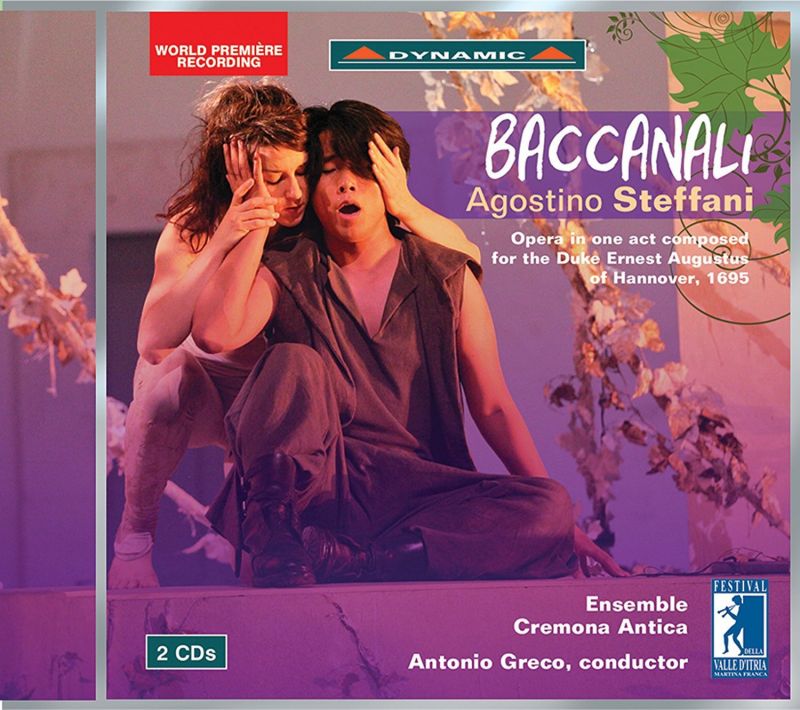STEFFANI Baccanali
View record and artist detailsRecord and Artist Details
Composer or Director: Agostino Steffani
Genre:
Opera
Label: Dynamic
Magazine Review Date: 08/2017
Media Format: CD or Download
Media Runtime: 85
Mastering:
DDD
Catalogue Number: CDS7770.02

Tracks:
| Composition | Artist Credit |
|---|---|
| Baccanali |
Agostino Steffani, Composer
Agostino Steffani, Composer Antonio Greco, Conductor Barbara Massaro, Driade, Soprano Chiara Manese, Fileno, Soprano Daisy Ransom Phillips, Dancer Elena Caccamo, Aminta, Mezzo soprano Ensemble Cremona Antiqua Joseba Yerro Izaguirre, Dancer Nicolò Donini, Atlas, Bass Paola Leoci, Clori, Soprano Riccardo Angelo Strano, Bacchus; Tirsi, Countertenor Vittoria Magnarello, Celia, Soprano Yasushi Watanabe, Ergasto, Tenor |
Author: Richard Lawrence
Truth to tell, Baccanali, staged in Hanover in 1695, is not a gripping drama. It’s a pastoral divertimento that begins with Atlas announcing that mortals can get relief from their sufferings during a festival consecrated to Bacchus; at the end, Bacchus himself arrives to celebrate wine, the antidote to all sorrow. In between are scenes for the shepherds Aminta and Tirsi and the nymphs Clori and Celia. Driade, daughter of Pan, is mocked for her fear of men; in a game of Blind Man’s Buff she is made to catch Fileno, whom the nymphs had teased for his lack of success in love. Another shepherd, Ergasto, laments his lot (reason unexplained).
No, not a gripping drama, but entertaining in its way. The music includes da capo arias, dances such as the gavotte and the gigue, and a French overture to introduce the proceedings. Some arias are accompanied only by the continuo; others include passages with violins, oboes or what the booklet calls flutes but which to me sound like recorders. The most touching aria, and at seven minutes by far the longest, is Ergasto’s ‘Cara pace, dolce calma’, a slow, gentle number which deserves more expressiveness than Yasushi Watanabe seems prepared to offer. Vittoria Magnarello and Paola Leoci make a jolly pair of nymphs, to whom Steffani gives catch-me-if-you-can imitative writing; jollity of a more surprising kind comes in ‘Per non riveder huomini’, where the roulades of Barbara Massaro’s put-upon Driade are quite at odds with the despairing words. Nicolò Donini shows off a fine bass but sadly is not heard after the opening scene. The tiny band under Antonio Greco play neatly.
For once, praise to Dynamic for including a booklet with the libretto and English translation. In the accompanying article, the confusion between ‘patera’ (a dish for libations) and ‘pantera’ raises the bar for mistranslation to a new, hilarious level (‘Bubbling panther, delightful liquor’).
Discover the world's largest classical music catalogue with Presto Music.

Gramophone Digital Club
- Digital Edition
- Digital Archive
- Reviews Database
- Full website access
From £8.75 / month
Subscribe
Gramophone Full Club
- Print Edition
- Digital Edition
- Digital Archive
- Reviews Database
- Full website access
From £11.00 / month
Subscribe
If you are a library, university or other organisation that would be interested in an institutional subscription to Gramophone please click here for further information.




